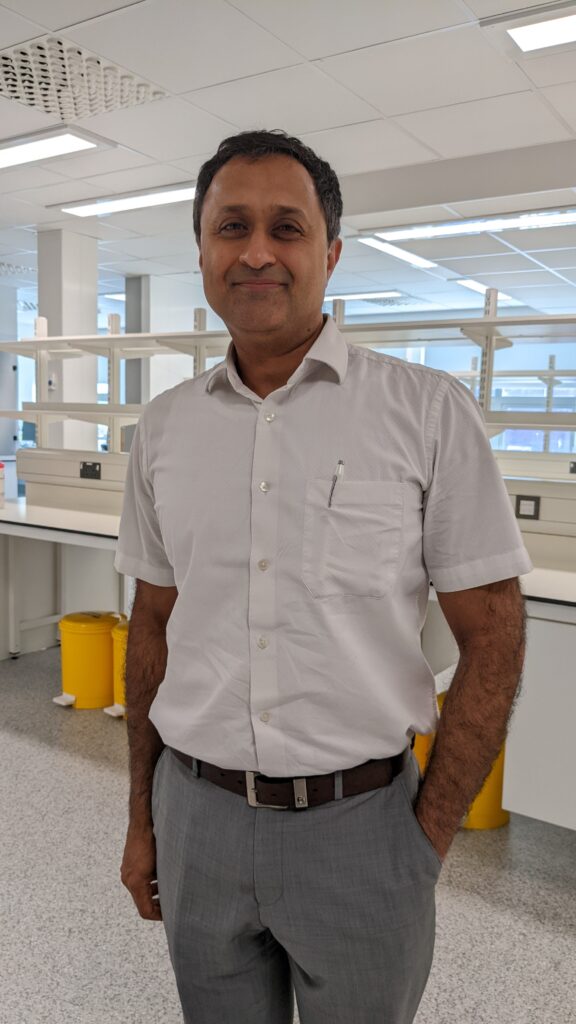To celebrate National Pathology Week, which coincides with the opening of the new histopathology lab at Blackpool Teaching Hospitals, we are hearing from some of the individuals who are looking forward to working in the new facility.
Dr Sameer Shaktawat, Head of Department, Department of Pathology
What is your role at the Trust?
I clinically lead Pathology which includes Cellular Pathology including Mortuary, Microbiology & Virology, Biochemistry, Haematology (lab), Blood Bank, POCT and ADAS. My main role is diagnostic which includes diagnosing and staging cancer and supporting cancer MDTs.
My role as a clinical manager is to ensure that Pathology provides a safe and high-quality service, which is efficient and effective.
Tell us about the new histopathology lab
I think it’s good timing, coming as it does during National Pathology Week.
The Cellular Pathology Lab modernisation has come during a time when the four trusts in the region are working together as a collaboration. The new Lab will provide resilience to our service and to cancer diagnostics overall.
This is one of the most modern labs in this country, state of the art. It’ll not only support cancer services but reduce turnaround times and improve patient care pathways.
We are very thrilled about it and proud of the team behind this achievement. I would like to thank all in the trust and in our department who have worked so hard to make this happen.
I had a walk around. It’s all shiny, new, and high tech which is going to uplift our service and help patients.
Talk to me about your own career path. Why did you choose pathology?
I graduated from India. During my house jobs both my maternal grandparents got cancer.
This opened my eyes, to cancer being such a big thing in people’s lives. I didn’t know a lot about cancer then. I wasn’t aware of the impact it has on families and the role of pathology in cancer patient journey.
I got interested in cancer and diagnostics from the time my grandparents were diagnosed with cancer. My grandfather had prostate cancer, a very common cancer for men. My grandmother had an unusual thyroid cancer which didn’t kill her but under the microscope it looked very aggressive.
During this time, I started asking questions. How do cancers behave? Why, some people die so quickly of cancer and others don’t and how does surgery and oncology help? What is staging? How do margins of the tumour help in a patient’s prognosis? These and many more questions led me do an MD in Pathology in India which I did for three years and then I wanted to specialise in cellular pathology. I came over to England and I trained in the Northwest for four and a half years.
In your career in pathology what have been the big changes?
There have been massive changes in the last four or five years ago.
Some major changes took place when Molecular pathology was used for cancer diagnostics and treatment. Although the tumour might look the same under the microscope, they will behave differently and that was down to the molecular level.
We were lucky in this Trust that we were able to get funding for lung cancer to do these new molecular tests. The advantage of these tests is that once the tumour is diagnosed, we can tell the clinicians what the molecular makeup of the cancer is, what it will respond to hence supporting individualised cancer treatment.
Another thing which has changed massively as well is that we can give more information now to the clinicians about a cancer which we couldn’t before. Staging is much more accurate; reports are a bit lengthier now because it’s more information for the clinicians. The clinicians can then through MDTs decide on the most appropriate treatment.
We can pinpoint the cancers more accurately now using immunohistochemistry. This science has exploded throughout the world, so we are just kind of absorbing all that into our system. New information is coming in every year, every six months, every month, even every day and everything is changing so rapidly. The future includes Digital Pathology and use of AI in diagnostics.
